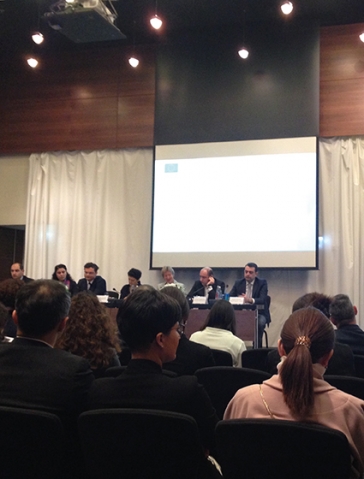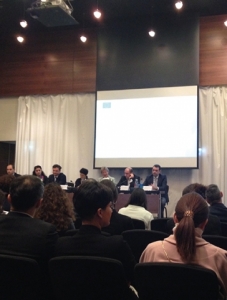Georgia Promotes Mediation & Arbitration through UNDP & EU Programs
The European Union (EU) and the United Nations Development Program (UNDP) are working on Alternative Dispute Resolution in Georgia. The Minister of Justice, Thea Tsulukiani, the UNDP head in Georgia, Louise Vuiton, and the Deputy Head of Cooperation Section at the Delegation of the European Union to Georgia, Catalin Gherman, among others, discussed these initiatives at the Radisson Blu Iveria Hotel in Tbilisi last week.
The Minister of Justice first highlighted that mediation is inherently part of the Georgian culture and heritage, and that it has been efficiently resolving disputes for centuries now. Indeed, Sophie Tkhemaladze, Chairperson of the Georgian Association of Arbitrators, described that in Georgian mountains, people have always asked mediators to help resolve conflicts.
Tsulukiani explained that the development of mediation creates fair and faster justice, which establishes a safer business environment. This enables Georgia to be a more and more attractive country for foreign and local investments. If people, as well as companies, can have access to mediators and arbitrators, they avoid going to court for disputes, saving time and energy.
“Where Georgians still highlight the slowness and expense of their judicial court system, they also recognize that the Georgian judiciary system is generally getting better,” Tsulukiani said, adding that she was working on these issues and that mediation was very promising in this direction.
Catalin Gherman noted that more alternative dispute resolutions would reduce the number of cases faced by the Georgian judiciary system, meaning less pressure and more efficiency.
“It’s a win-win situation for people and companies as well as for the judiciary. People and investors need to have trust and to feel that they are in a safe and predictable business environment in Georgia”, she said.
Irakli Lekvinadze, Business Ombudsman of Georgia, explained that there is a high number of commercial disputes and that mediation units are already doing a good job intervening. He said that more and more people were coming to him because they could see the efficiency of such alternative resolutions.
“To develop mediation and arbitration in Georgia, we need to train people to become mediators,” David Asatiani, Executive Director of the Georgian Bar Association, explained. “I’ve been working with a lot of lawyers who are interested in being trained as mediators. Psychologists and professors are also disposed to it”.
Georgia’s objective is to become the mediation center of the region. Already, people from Uzbekistan have been coming to Georgia to learn more about mediation and arbitration. Georgia needs to keep inviting experts and working in cooperation with the EU and UNDP to strengthen this promising initiative.
By Gabrielle Colchen











